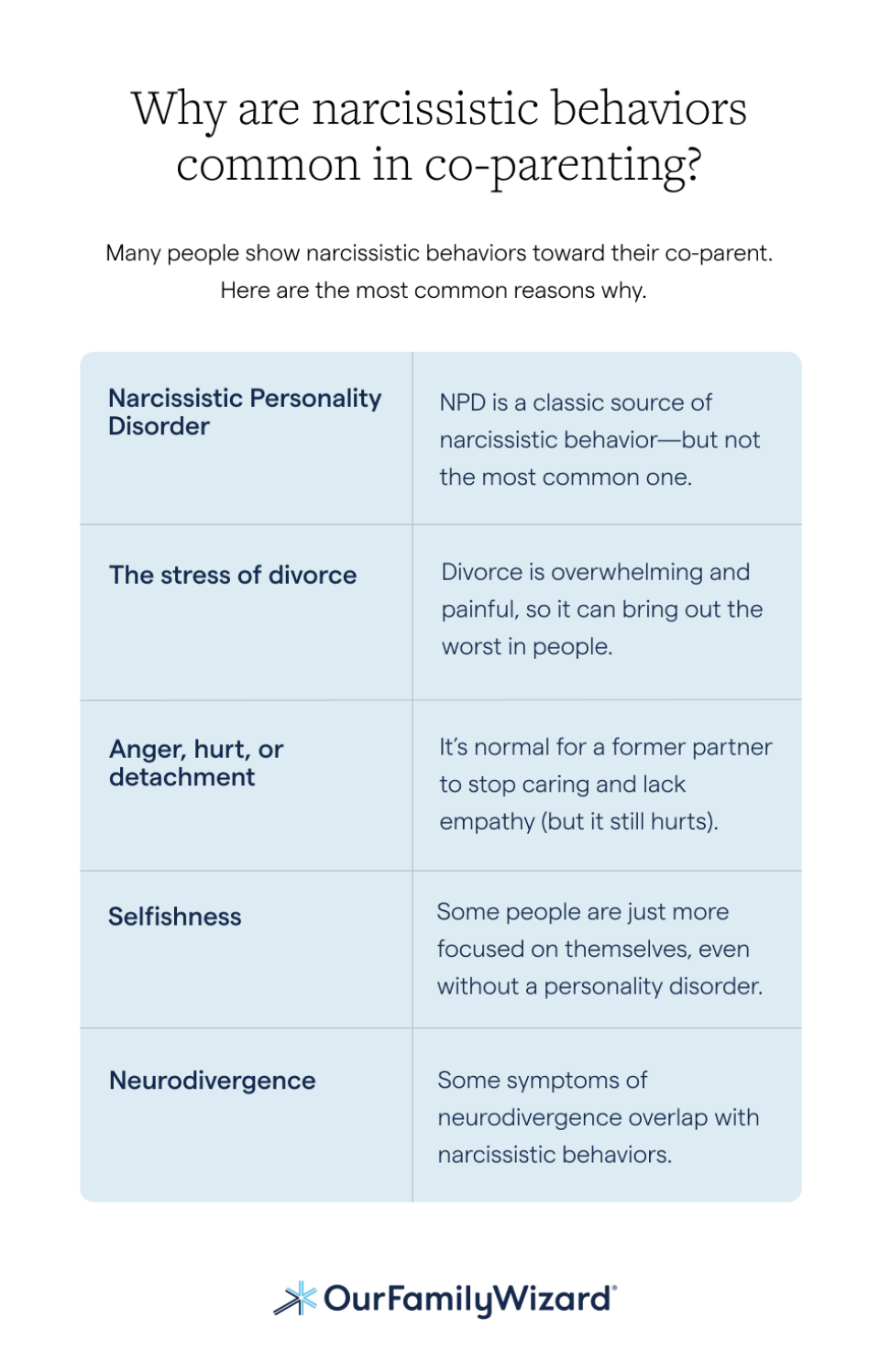Why Calling Your Co-Parent a Narcissist Can Backfire—Even If It’s True
If your co-parent shows narcissistic behaviors, it can be an intense and overwhelming experience. Whether your co-parent officially has Narcissistic Personality Disorder or not, some behaviors can’t be ignored or tolerated. But calling your co-parent a narcissist can backfire—majorly.
Inside this article
Recognizing narcissistic behaviors seems like a simple way to explain the conflict, but it’s not that simple in practice. In fact, calling your co-parent a narcissist is not only likely to worsen your co-parenting relationship, but it can also damage any legal case you may have.
“I think people's voices are diluted when they focus on the label,” warns Dené Carroll, a licensed clinical social worker. “Every therapist, every attorney, every judge, has heard out of the mouth of nearly every person, ‘I'm co-parenting with a narcissist.’ I think it dilutes the important things that are going wrong when you do that. Instead, focus on the behaviors and the boundary violations. That will actually help move a co-parenting relationship forward.”
“The judge is never going to sentence somebody to jail for being a narcissist,” notes Dr. Rebecca Bailey, PhD, trauma therapist, author, and founder of Transitioning Families and the Polyvagal Equine Institute.
Another reason to be careful with labels like "narcissist" is that people with mental health conditions, such as Narcissistic Personality Disorder (NPD), may have protections under the Americans with Disabilities Act (ADA). Dan Berstein leads the Mental Health Safe Project (www.mhsafe.org), which provides free tools to help people with mental health conditions speak up when they encounter stigma and discrimination. Rather than open the door to those kinds of claims by attacking a co-parent's possible mental health problems, it's much simpler to just lose the labels and stay focused on boundaries and behaviors.

How to shift away from the label “narcissist”
Calling your co-parent a narcissist without an official diagnosis of NPD distracts from the problematic behaviors they are exhibiting. It’s difficult or impossible to prove the diagnosis, but easy to document behaviors.
“Most of the people that I talk with now will say, ‘My ex is a narcissist,’” says Dr. Christine A. Profito, a licensed clinical psychologist and qualified parenting coordinator working with the National Cooperative Parenting Center (NCPC).
“But it can be dangerous to rely on that as the answer instead of saying, ‘How do I solve this problem? How do I establish better communication strategies? What is a different perspective I can take?’ That normally helps progress the relationship and provide a healthier environment for the kids rather than simply trying to win the blame game.”
“Certainly always, if there are safety concerns for the wellbeing of the children, you know that needs to be assessed,” says Dr. Bailey. “Otherwise, we look for context to explain the behavior.”
“Nobody but licensed therapists and psychiatrists should be diagnosing personality disorders,” notes Dr. Bailey. Since Narcissistic Personality Disorder (NPD) is a mental health condition listed in the DSM-5 (the official medical guidebook for mental health disorders), only a professional can make that diagnosis.
But whether your co-parent has an NPD diagnosis or not, there are plenty of specific strategies for responding to behaviors that look like narcissism.
Carroll says, “It's really hard to co-parent with someone who is very opinionated, inflexible, and dismissive. I think people find communities, blog posts, books that resonate with their experience and are branded with this narcissism lens, and I think they feel seen and heard and understood by other people's experience. And so they really latch on to this labeling because it resonates so deeply with them.”
“But it's problematic because it's not specific. It doesn't actually describe what's going wrong in this relationship and what kind of boundaries you need for this to get back on track.”
“It's a very hot topic right now, says Micaela Van Dine, court-ordered forensic therapist and custody evaluator. “I think it's easier for people just to diagnose their co-parent: ‘Oh, well, they're self-centered, so they must be a narcissist.’ But when someone comes to me for help, I'll tell them, ‘Let's stay away from the narcissist diagnosis and start focusing more on the high-conflict personality, because there's a different approach for that.’”
Why the stress of divorce can make people look or act like narcissists
If you’re surprised by your co-parent’s behaviors, those new actions might be triggered by the stress of divorce. Even if the behaviors look like narcissism, they could simply be coping mechanisms that arise in an intensely stressful situation.
“Of course, divorce is one of the most difficult times in a life,” says Dr. Bailey, “and the person that you married and fell in love with may suddenly feel like somebody you don't recognize. And so we try to make sense of what may, in fact, be simply defensive behavior or reactive behavior.”
“When you are seeing these types of behaviors in a spouse, you have to understand that this is a very high conflict situation,” says Dr. Profito. “You're likely not seeing the accurate, full-picture reflection of who that person truly is. You're getting the worst of them at the worst time in their life, because you're divorcing them. They might not like you at all, and vice versa.”
“It is very hard to be in a relationship with someone that you feel is no longer compassionate towards you,” adds Dr. Bailey. “It's very disorienting to have the person you love suddenly act like they don't care.”
“The diagnostic criteria for Narcissistic Personality Disorder includes unreasonable expectations, like expecting other people to comply with their demands,” Dr. Profito notes, “But you can often see those types of behaviors in high-conflict divorce cases, even with non-narcissists. These behaviors might be rooted in anger or rooted in hurt, and they come out sharp and controlling.”
When neurodiversity looks like narcissism
Another factor to consider is that “neurodiversity can look like narcissism,” Carroll points out. “Someone who's inflexible, lacks the ability to see someone else’s perspective, gets really stuck on something, and is resistant to change, can look like a narcissist.
“But there are a lot of people who have neurodiversity. Adult autism is underdiagnosed. It doesn't quite have the same sting that narcissism does or the same stigma. But at the same point, it still isn't helpful, because we still don't understand, ‘So what? What’s next?’”
How to manage your own emotions when dealing with narcissistic behaviors in co-parenting
Even though co-parenting with a person who displays narcissistic behaviors is upsetting and disorienting, managing your emotions is absolutely crucial to handling the situation strategically.
Why it helps to shift away from your emotions
The “narcissist” label can prompt professionals to dismiss your concerns—and the same thing can happen when you focus on your emotions. It is incredibly normal to feel pain, anger, confusion, and grief, but highlighting those emotions in co-parenting or in court might not help.
“Let that parent’s behavior speak for itself,” says Carroll. “Sometimes the dysregulated (emotionally upset) parent becomes the focus of all the attention, when what really needs to happen is that parent needs to become more regulated and have better boundaries, so that it doesn’t distract from the other parent’s behavior.”
Focusing on your activated emotions can even affect your children. “When you are activated and dysregulated by your partner,” explains Dr. Bailey, “you become very dysregulated in communication with other people. You're not effective in your own communication, and your kids feel it.
“A child just needs one parent to be regulated, clear, and present. To achieve that, you have to work on the dysregulation by focusing on the other's behavior, not labels, because that just has you in fight or flight mode all the time.”
“The question is, what is the trait?” asks Carroll. “We don't even need to say, ‘My co-parent has narcissistic traits’—that’s still labeling. We still haven't described it. Instead, you need to say, ‘My co-parent won't respond to me.’ We need to even get away from trying to figure out, ‘Is it a trait, or is it a disorder?’
“We need to move towards: ‘What is the actual thing that's happening that you don't like or isn't working for you?’”
Trying to explain the root cause of a behavior is not helpful in co-parenting
It’s easy to assume you know how someone feels based on their actions, but it’s impossible to know for sure. Assuming your co-parent’s intention “will actually inflame a difficult person who you think has narcissism or narcissistic traits,” says Carroll.
“It will actually entangle them and spin the whole situation out even worse. That is going to create such a disorienting conversation that none of the core issues are ever going to be addressed. It's just going to be a distracting, distressing interaction.”
“And that's what's so beautiful about OurFamilyWizard,” Dr. Bailey adds. “It stays out of the noise of all of it and encourages language that is appropriate.
“Staying out of the noise encourages co-regulating behavior and self-regulation. A productive conversation is only possible when the involved parties are regulated enough to problem solve.”
Another reason to avoid the label: Calling your co-parent a narcissist could trigger them to dig in their heels even further. They might stay in denial or become defensive and lash out, rather than recognizing that their behaviors are problematic and then seeking mental health treatment. Having a difficult parent get mental health support is in the best interest of your child.

“I wouldn't say by any stretch that somebody with a personality disorder can't be a good parent,” says Dr. Profito. She explains that it’s important to separate parenting from co-parenting, because your co-parent might relate to you and your children very differently.
“How someone behaves as a spouse or a co-parent does not necessarily have a direct correlation to how they're going to be as a parent. You just have to learn how to rein those things in,” Dr. Profito explains.
“Sometimes you need an intermediary—like OurFamilyWizard—to help tone the energy down,” says Dr. Bailey. “Often, when you step out of the battle, your co-parent is still the same person that you married and may indeed have some positive parenting traits.
“On the other hand, the very same traits that attracted you to someone may become the very things that repel you. For example, the confidence and self-assuredness of a former partner can now appear cocky and self-absorbed.”
Carroll agrees. “Even if there's a diagnosis of narcissistic personality disorder, that does not disqualify you from parenting, having parenting time, or engaging in co-parenting counseling. Even if you have the diagnosis, it does not mean much without understanding how the behaviors impact the children, how the behaviors impact the co-parenting relationship. So we still have to do the work of specifying the behavior, even if we have the diagnosis.”
“As their parent, it’s not best to go in and say, ‘Your father has narcissistic personality disorder,’” Dr. Profito cautions—even if they have been officially diagnosed. Instead, she suggests saying something like, “Keep in mind that Dad's a person, and he has reactions and emotions, and some of that may not be because of you.”
What does narcissism look like in parenting?
Dr. Profito explains, “One of the criteria for NPD is needing excessive admiration from other people. That's what you're likely to see in parenting: ‘I need my child to praise me, to think I'm awesome and amazing and to not turn against me.’”
“The child of a narcissist can have low self-esteem or feel anxious around the narcissistic parent,” says Van Dine. “But the narcissist is particularly threatened by the autonomy and individuality of a teenager. It’s a really sad dynamic to watch.
“Narcissists can play the game for a while, when the kids are younger and still doting on their parents. Teenagers can be spiky, and they can be rejecting, and that's when narcissists can lose interest.
“If the non-narcissistic parent is a healthy parent, they can still support the child in loving the other parent. But they can also teach the child about boundaries.
“This is where working with a really good therapist is so helpful,” Van Dine adds. “The child can learn, ‘Maybe my Mom doesn't really understand empathy,’ or ‘Maybe Dad's not the person I should run to when I'm going through a bad breakup.’
“When kids grow into teenagers, they start to learn who their people really are and what their limitations are. And what I've seen in teenagers with a narcissistic parent is that they're grieving. They're starting to recognize that the parent they had on a pedestal is very flawed.”
Most experts agree that Narcissistic Personality Disorder (NPD) is shaped by both nature and nurture. There may be a genetic component, but either way NPD can run in families, because childhood experiences can forge the disorder—and they’re often repeated across generations.
“In the bigger picture field of psychology over the years,” explains Carroll, “there's been more of a push towards categorizing this cluster of traits through a lens of complex post-traumatic stress disorder (C-PTSD). These kinds of clusters of disorders are often rooted in childhood trauma. That doesn't give people a pass to behave in ways that are not okay, or to be abusive towards their partners, but also important to hold up a lens that shows it's not about villainizing people. It's about understanding that people got this way for a reason.”
“For nurture,” says Dr. Profito, “What communication strategies are you witnessing between the adults in your life? What are you being taught? Do you feel heard? Or do you feel like you have to demand or grab or take things?”
“I've actually treated narcissists as a therapist,” says Van Dine, “and a lot of them have experienced sexual abuse. So they ended up going with the narcissistic personality traits to mask the trauma. Narcissism is a way to regain control.
“The second way someone becomes a narcissist is through being raised by an overindulgent parent, which in turn causes the child to become self-centered and entitled. They grow up to expect others to treat them as ‘special’ and free from the consequences of their bad behavior, which can lead to anti-social behavior.
“I don't mean anti-social as in ‘you're a hermit, and you're holed up in a house for your childhood’—I mean you believe social rules don't apply to you. Laws don't apply to you. You're better than everybody else. You don't have to respect people. You know you are above the law.
“I was a forensic clinician working with registered sex offenders. I would see this a lot with them: They didn't have to respect our laws. They didn't have to respect women's bodies. They didn't have to respect any of that, because the laws don't apply to them.”
A study published in the Journal of Research Personality also found that when parents show hostility to their children, those children are more likely to develop exploitative traits, which are common in narcissism.
A thesis from the Bridgewater State University Honors Program found that “vulnerable and grandiose narcissism are both linked to more negative parenting styles—known as overprotection and rejection.” Both types also make the child more likely to develop “anxious attachment and avoidant attachment” styles. Vulnerable narcissism, especially, “was linked to lower rates of self-esteem and well-being.”
Children can be affected by their parent’s NPD as young as three years old, according to a study in the Proceedings of The National Conference on Undergraduate Research. When parents don’t consider their child’s developmental stage and treat them in a way that doesn’t match that stage, those parenting behaviors can affect the development of the children’s personality—or even a personality disorder. This can happen at any point during their childhood or when they are teenagers.
“Whatever role genes play in narcissism,” Verywell Mind explains, “NPD definitely can run in families.” In fact, Charlie Health notes, “The risk of inheriting narcissism is over 50% in some cases.”
But if you’re worried about your children being partially raised by a narcissist, it might be encouraging to know that narcissistic traits are not 100% negative.
“Narcissistic personality disorder is not common,” Dr. Profito explains. “But I would say that lots of people have narcissistic traits. You want to have the confidence to advocate for yourself, to stand up and hold boundaries and say when something's not going your way, or to fight for your beliefs.”
In fact, “The more educated and successful people tend to be, the more prevalent those traits then become. For example, a lot of surgeons have narcissistic-type personalities—in a positive way, because you want somebody who's confident and feels good about what they're doing! You need confidence to get yourself through med school. And when you’re running a practice, there are a lot of people who are under you who need that structure and direction.”
Dr. Profito adds, “If you're a successful person in your field, you probably have some narcissistic traits, and that's not a bad thing.”
Of course, it’s not all silver linings. Narcissistic behaviors can cause “mental, emotional, and psychological abuse where they're talking down to you, putting you down, and demeaning you. It can lead to physical abuse,” says Dr. Profito. “But a lot of times, you just feel like you are a very tiny person.
“You may feel like you’re only worthy of something because of your affiliation with this highly important individual, and they have favored you enough to welcome you into this partnership.”
It's common to experience many physical and emotional effects when your partner or former partner has Narcissistic Personality Disorder. These effects can include:
- Anxiety
- Depression
- Post-traumatic stress
- Loss of self-worth
- Physical pain (like headaches or body aches)
- Trouble sleeping
- Short-term memory loss
- Mood swings
- Depersonalization
- Trust issues
- People pleasing
- Self-destructive habits
Treating these effects in therapy takes “a lot of undoing the things that we internalize,” explains Dr. Profito. “This probably was not your first relationship where you were treated in that manner. You might feel, ‘This is what I was taught. I was directly told that I wasn't worth a whole lot,’ or it can be modeled for you from your parents, or your teachers, or other adults. And then it just becomes, ‘This is what is familiar. And this is what I equate to love.’”
It also helps to understand your own feelings better, because they can get very jumbled. That is something you can work on in therapy. Joining a support group can provide additional perspective and comfort. Practicing self-care is another crucial part of recovering from narcissistic abuse.
Take care of yourself and your children
Whether your co-parent has NPD or not, you and your children deserve to be treated with respect. If your co-parent habitually mistreats you or places their own desires above your child’s best interest, then you and your child both need to get into therapy, and you might need to consult an attorney.
Most of all, keep your head above water by reminding yourself what is true and real. And keep in mind that having just one stable, loving parent gives your child an excellent chance to grow up mentally and emotionally healthy.









